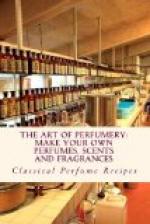HELIOTROPE.—Either by maceration or enfleurage with clarified fat, we may obtain this fine odor from the flowers of the Heliotrope Peruvianum or H. grandiflorum. Exquisite as the odor of this plant is, at present it is not applied to use by the manufacturing perfumer. This we think rather a singular fact, especially as the perfume is powerful and the flowers abundant. We should like to hear of some experiments being tried with this plant for procuring its odor in this country, and for that purpose now suggest the mode of operation which would most likely lead to successful results. For a small trial in the first instance, which can be managed by any person having the run of a garden, we will say, procure an ordinary glue-pot now in common use, which melts the material by the boiling of water; it is in fact a water-bath, in chemical parlance—one capable of holding a pound or more of melted fat. At the season when the flowers are in bloom, obtain half a pound of fine mutton suet, melt the suet and strain it through a close hair-sieve, allow the liquefied fat, as it falls from the sieve, to drop into cold spring water; this operation granulates and washes the blood and membrane from it. In order to start with a perfectly inodorous grease, the melting and granulation process may be repeated three or four times; finally, remelt the fat and cast it into a pan to free it from adhering water.
Now put the clarified suet into the macerating pot, and place it in such a position near the fire of the greenhouse, or elsewhere that will keep it warm enough to be liquid; into the fat throw as many flowers as you can, and there let them remain for twenty-four hours; at this time strain the fat from the spent flowers and add fresh ones; repeat this operation for a week: we expect at the last straining the fat will have become very highly perfumed, and when cold may be justly termed Pomade a la Heliotrope.
The cold pomade being chopped up, like suet for a pudding, is now to be put into a wide-mouthed bottle, and covered with spirits as highly rectified as can be obtained, and left to digest for a week or more; the spirit then strained off will be highly perfumed; in reality it will be extract of Heliotrope, a delightful perfume for the handkerchief. The rationale of the operation is simple enough: the fat body has a strong affinity or attraction for the odorous body, or essential oil of the flowers, and it therefore absorbs it by contact, and becomes itself perfumed. In the second operation, the spirit has a much greater attraction for the fragrant principle than the fatty matter; the former, therefore, becomes perfumed at the expense of the latter. The same experiment may be repeated with almond oil substituted for the fat.
The experiment here hinted at, may be varied with any flowers that there are to spare; indeed, by having the macerating bath larger than was mentioned above, an excellent millefleur pomade and essence might be produced from every conservatory in the kingdom, and thus we may receive another enjoyment from the cultivation of flowers beyond their beauty of form and color.




